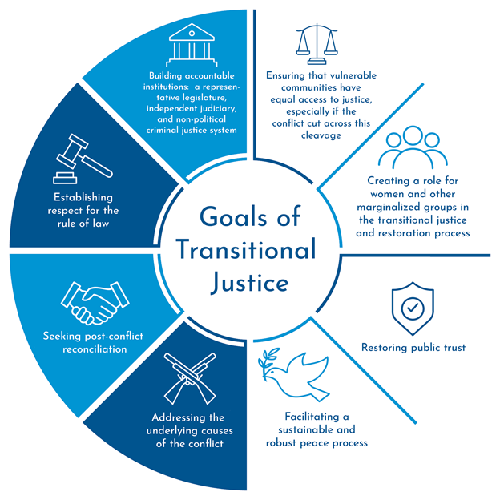
According to documents, countries around the world through transitional justice processes can address challenges created among societies and groups, resolve the problems; put the damaged relations right and sustain peace.
It is crystal clear that the transitional justice system is the process of acknowledging, prosecuting, compensating for and forgiving past crimes committed by the perpetrators. A properly designed and implemented transitional justice process offers the framework to resolve the causes and drivers of violence, overcome violations and divisions that were sowed over the years and arrest conflicts.
In view of this, Ethiopia is also working to hold a credible and participatory transitional justice process that addresses the peoples’ grievances and heals societal denigration.
Recently, the Transitional Justice Expert Team has presented its draft report on policy direction alternatives, public consultation and input gathering process.
Speaking on the occasion, Transitional Justice Expert Team Chairperson Tadesse Kassa said that implementing transitional justice mechanisms has become an integral part of Ethiopia’s efforts to sustainable peace, reconciliation, and justice.
“It is very important to design and implement a transitional justice system in terms of facilitating nation-state building, ensuring sustainability, and realizing a democratic political society that will rely on the basic principles of human rights and the rule of law.”
To this end, the team carried out extensive consultations with victims, communities affected by conflicts, religious leaders, community leaders, media, influential persons and segments of the society, he elaborated.
According to him, the consultation forums and input gathering process have affirmed that the public accepts the implementation of the transitional policy.
Presenting the findings, Kalkidan Dereje, a member of the Transitional Justice Expert Group said the participants strongly demanded accountability of offenders.
The participants have in particular stressed the need for a prosecution process on perpetrators who have committed gross violation of human rights, she added.
With regard to the question which perpetrators should be prosecuted, Kalkidan said that the findings indicate that most of the participants stated that individuals who have committed serious crimes, those who planned, gave orders, and led should be held with high accountability. In the same way, others who have not fulfilled their responsibilities aspiring to avoid harm should also be prosecuted.
According to the findings a special court should also be established to conduct the trial process. Moreover, the findings from the public consultation forum recommend the formation of a fact finding body.
The participants have also suggests compensation for damages inflicted on those who have suffered serious human rights violations, experienced psychological and mental crises, suffered severe physical injuries and sexual violence as well as for displaced persons and those who have lost their families, among others, during the implementation process of transitional justice.
The transitional justice expert team has finally made a recommendation that the time frame for transitional justice begins from 1995.
The report of the expert team was developed based on findings of 80 public consultation forums held from February 2022 to September 2023 with a view to soliciting inputs from relevant stakeholders.
In an exclusive interview with The Ethiopian Herald YDA Civil Society Manager Kiflu Bifru said that listening to the victims and documenting the history of social and political conflicts in the country is precisely an important step because it builds trust among the society and the justice structure.
“The government and all stakeholders should walk the talk in effectively translating the transition justice process to the ground,” he opined.
According to him, the ultimate and long term goal of the program should be to secure peace and stability in the future, promote democracy as well as reconciliation among the people and to move forward with a spirit of unity and solidarity.
As to him, the process is a new way of approach that Ethiopia has not experienced in prior time. Owing to this, we should use the chance to undo the inconveniences and differences nationwide; and nurture this culture among the people so as to avert conflicts, resolve disagreements peacefully through dialogue, round the table
“In my view, transitional justice should be considered as a stepping stone to building the nation and shaping a national consensus among citizens, while continuing the political transition based on shared values that bond all societies.”
Publicizing the performance of the transition justice efficiency should be strengthened because it is important to create the spirit of transparency and confidence and build trust between and among society.
Last but not the least, ultimate efforts should be made in identifying the violations in a historical, political, social and economic context and try to learn and examine their root causes of each conflict because identifying the root causes of grievances is one step to address the conflicts and find sustainable solutions.
“This is the sole way out to pulling Ethiopia out of the predicament of the ongoing political infighting that could drag the country towards a deadly civil war. The community is yearning to witness how justice and sustainable peace is ensured throughout the nation. The trails should work to hold wrongdoers accountable for the crimes they have committed,” he added.
The Civil society and international community should keep on supporting Ethiopia’s Transitional Justice process through providing financial and technical support, he further said.
According to him, if the transition justice process is carried out accordingly and translated to the ground in productive fashion, it could help in ensuring rule of law throughout the nation. However, if the grievances are not addressed well, they can cause inconveniences and become sources of social unrest and renewed violence.
BY MENGISTEAB TESHOME
THE ETHIOPIAN HERALD THURSDAY 25 JANUARY 2024





